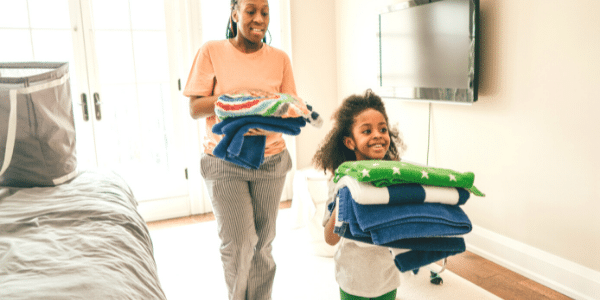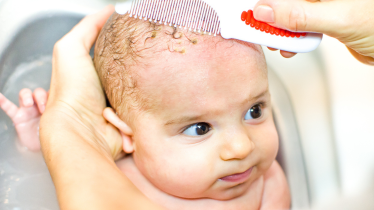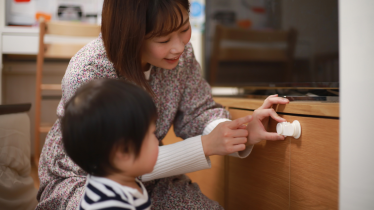New Parent Resources: Building Good Habits for Children
Your home is where you are instilling lessons your children will carry with them for the rest of their lives. As parents, we have a responsibility to help build healthy home habits with our children early-on, so they are set up for success into adulthood. Here’s how you can start encouraging healthy home habits with your children to ensure they have a strong foundation for the future.
Your Example is Massively Influential in Childhood Development
It’s important to keep in mind that one of the most powerful influences on childhood development is the example parents set. Children look to us to learn how to navigate the world. Given our influence, engaging our children in everything we do is extremely beneficial to establishing healthy habits. In the household, one way we can promote positive growth includes involving children in chores and interacting with our children with intention.
As you are navigating your day-to-day life, the way you speak and conduct yourself impacts how your children perceive tasks and situations. As an example, if you make doing chores seem like it’s just a normal part of the day (or even something that can be fun), your children won’t think of chores as the same level of burdensome they would if you were visibly dreading the chore. The same is true for encouraging nutritious meals, staying active, and managing emotions. Your example at home is essential to your child’s ability to build healthy habits.
Empower Your Children with Age-Appropriate Chores
When you are working toward building healthy home habits, ensure you are setting you and your children up for success. Age-appropriate chores are a great way to do that. They allow you to form habits early that can be built upon as your child grows.

Starting early is key to making tasks seem less daunting. If your child has been accustomed to some type of chore for as long as they can remember, maintaining new responsibilities as they get older becomes much more seamless. Based on childhood development, here are some suggestions to help you navigate age-appropriate chores.
2-3 Years Olds
Around the toddler stage, your children will need the most guidance as they navigate their chores. Keeping in mind you will need to be involved with these chores, around 2 years of age, you can begin showing your child how to do things like:
- Put away their toys when they’re finished
- Organize books
- Put clothes in the laundry hamper
- Help make their bed
4-5 Years Olds
While your example is still influential to your child’s learning, now your child is moving into a stage where they can complete some chores independently. The chores they need help with versus chores they can do alone will vary by child, but around this age, children can do chores such as:
- Water flowers and plants
- Sort laundry to be washed
- Clean up the dinner table
- Help bring groceries inside
- Tend to pet bowls
6-9 Years Olds
In this phase, your child is more capable than ever before to take on chores themselves, but they probably are the least interested in it. Before, your child was excited to help mom and dad, but this stage is typically where some rebellion sets in. That makes consistency through this stage even more important. Chores your child can now take on include:
- Sweeping
- Cleaning their room
- Loading the dishwasher
- Preparing snacks and breakfast for themselves
- Helping to make dinner
- Vacuuming around the house
10+ Years Olds
There are some differences in the chores a 10-year-old can do versus chores a 15-year-old can do, but the differences aren’t as drastic as we have seen in each previous stage. Once your child is 10 or older, that is a great time to give them specific chores they manage in the household. That could include things like:
- Doing their own laundry
- Taking out the garbage
- Cooking simple (to more complex, as they age) meals
- Washing the dishes
- Overseeing pet care

Using Childhood Development to Build Good Habits for Children
The foundation you lay with your children in your home is the groundwork to how they will approach adulthood. Beginning with the example you set from the time they are born to the consistency you uphold through each stage of their life, you are preparing your child to have healthy home habits not only when they live with you, but when they begin living on their own, as well.
While it can feel like we are always searching for the latest parenting hacks, sometimes going back to the basics of childhood development will help us make the largest impact on our children. If you have continued questions about how to build healthy home habits with your child as they develop through various stages, your pediatrician is always a fantastic resource. For Buffalo families, Medical Health Associates of Western New York is always happy to help.












